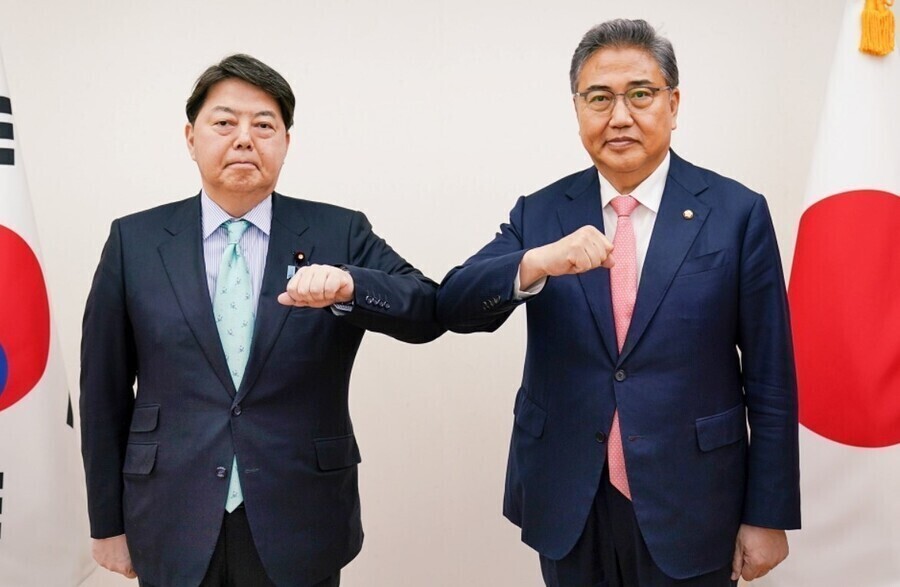hankyoreh
Links to other country sites 다른 나라 사이트 링크
S. Korean FM heads to Japan amid tensions over reparations for forced labor victims

On Monday, South Korean Foreign Minister Park Jin will be meeting with Japanese Foreign Minister Yoshimasa Hayashi for the first time since his inauguration. Whether he will be able to bring about a change in attitude regarding the issue of forced labor during the Japanese colonial period from the Japanese government is drawing interest.
The last time a South Korean foreign minister visited Japan for a bilateral meeting rather than a multilateral one was four years and seven months ago, when then-South Korean Foreign Minister Kang Kyung-wha visited Japan in December 2017.
The meeting is projected to focus on the liquidation issue following the Supreme Court of Korea’s ruling regarding compensation for victims of forced labor during the Japanese colonial period.
The South Korean government has held two meetings of the public-private consultative body it formed to resolve the issue of forced labor, one on July 4 and another on Thursday, both of which were presided over by South Korean First Vice Minister of Foreign Affairs Cho Hyun-dong and attended by legal representatives of the victims, members of victim support groups, and experts from academic, legal and financial fields. Although the group has been discussing ways to resolve the matter, the situation surrounding the case has been tough-going, as victims of forced labor by Mitsubishi Heavy Industries, which is facing impending liquidation procedures, declared it would not participate in the public-private consultative group.
Park is expected to explain to Japan such efforts carried out by the South Korean government and the difficulties of coming up with a solution. Although the South Korean government is taking a proactive stance on the matter, the Japanese government is also of the mind that South Korea-Japan relations should be improved so that Russia’s invasion of Ukraine and threats from China and North Korea can be responded to.
Yun Duk-min, the new South Korean ambassador to Japan who began his tenure on Saturday, met with reporters at Haneda Airport in Tokyo, where he said, “Action from one side isn’t enough to resolve problems. Just like both hands need to come together to make a clapping sound, mutual cooperation is needed” — pointing out that since South Korea has taken action to seek a resolution, Japan should follow suit.
Moreover, regarding how to resolve the issue of forced labor, Yun said, “I will take the 2015 [South Korea-Japan] ‘comfort women’ agreement as a lesson.”
Despite the agreement inked between the South Korean and Japanese governments on Dec. 28, 2015, victims of wartime sexual slavery by the Japanese military have waged a fierce opposition, even taking the matter to court. Hence, if the opinions of victims are not sufficiently mediated, the issue may not completely be resolved despite an agreement between governments, just like in the case of the “comfort women” issue.
There are two preconditions to be met in order for the South Korean government to sort out the issue of compensation for victims of forced labor. First, Mitsubishi Heavy Industries, Nippon Steel, and other offending companies who committed war crimes and lost in suits in South Korea must apologize, and these companies must participate in the compensation process in whatever shape or form.
Meanwhile, the Japanese government has shown no signs of a change in attitude. The Japanese Foreign Ministry issued a statement Friday, stating that it will “closely communicate with South Korea by utilizing Park’s visit to Japan based on Japan’s consistent position in order to restore sound Japan-South Korea relations.”
The expression “Japan’s consistent position” signifies Japan’s insistence that the issue of forced labor during the Japanese colonial period as well as other historical issues have been resolved through the 1965 Treaty on Basic Relations and the 2015 “comfort women” agreement.
By Kim So-youn, Tokyo correspondent
Please direct questions or comments to [english@hani.co.kr]

Editorial・opinion
![[Column] Has Korea, too, crossed the Rubicon on China? [Column] Has Korea, too, crossed the Rubicon on China?](https://flexible.img.hani.co.kr/flexible/normal/500/300/imgdb/original/2024/0419/9317135153409185.jpg) [Column] Has Korea, too, crossed the Rubicon on China?
[Column] Has Korea, too, crossed the Rubicon on China?![[Correspondent’s column] In Japan’s alliance with US, echoes of its past alliances with UK [Correspondent’s column] In Japan’s alliance with US, echoes of its past alliances with UK](https://flexible.img.hani.co.kr/flexible/normal/500/300/imgdb/original/2024/0419/2317135166563519.jpg) [Correspondent’s column] In Japan’s alliance with US, echoes of its past alliances with UK
[Correspondent’s column] In Japan’s alliance with US, echoes of its past alliances with UK- [Editorial] Does Yoon think the Korean public is wrong?
- [Editorial] As it bolsters its alliance with US, Japan must be accountable for past
- [Guest essay] Amending the Constitution is Yoon’s key to leaving office in public’s good graces
- [Editorial] 10 years on, lessons of Sewol tragedy must never be forgotten
- [Column] A death blow to Korea’s prosecutor politics
- [Correspondent’s column] The US and the end of Japanese pacifism
- [Guest essay] How Korea turned its trainee doctors into monsters
- [Guest essay] As someone who helped forge Seoul-Moscow ties, their status today troubles me
Most viewed articles
- 1[Column] The clock is ticking for Korea’s first lady
- 2Samsung barricades office as unionized workers strike for better conditions
- 3After 2 months of delayed, denied medical care, Koreans worry worst may be yet to come
- 4[Correspondent’s column] In Japan’s alliance with US, echoes of its past alliances with UK
- 5[Column] Has Korea, too, crossed the Rubicon on China?
- 6Hong Se-hwa, voice for tolerance whose memoir of exile touched a chord, dies at 76
- 7[Editorial] When the choice is kids or career, Korea will never overcome birth rate woes
- 8Constitutional Court rules to disband left-wing Unified Progressive Party
- 9Nearly 1 in 5 N. Korean defectors say they regret coming to S. Korea
- 10‘Right direction’: After judgment day from voters, Yoon shrugs off calls for change